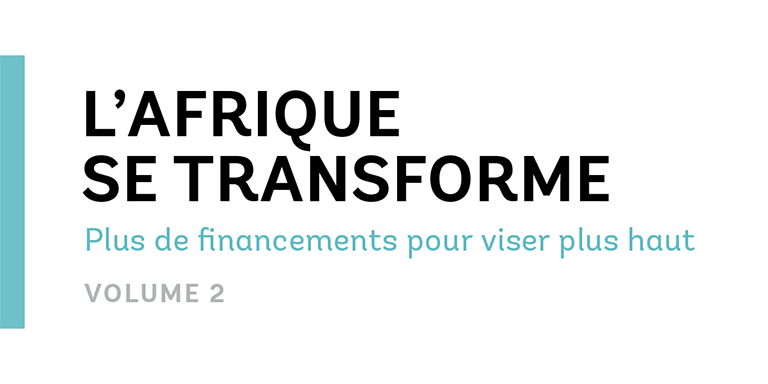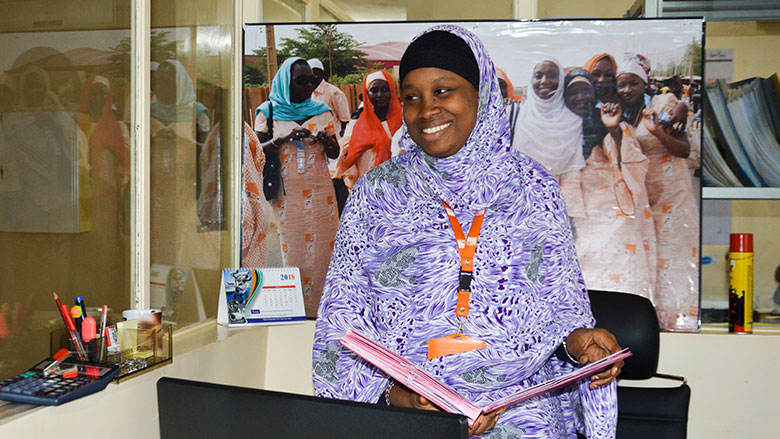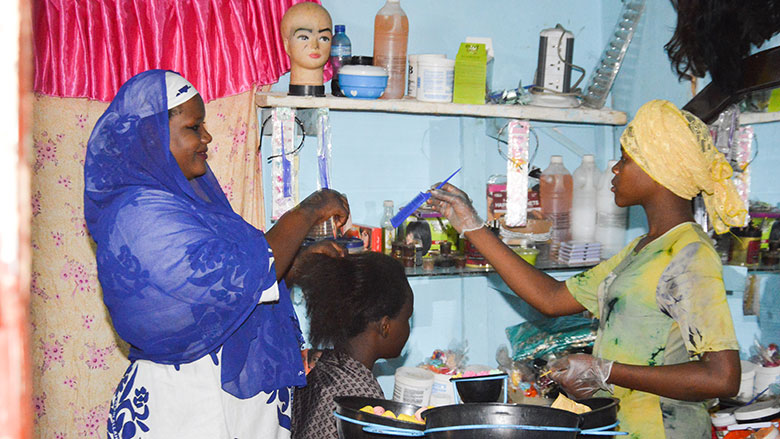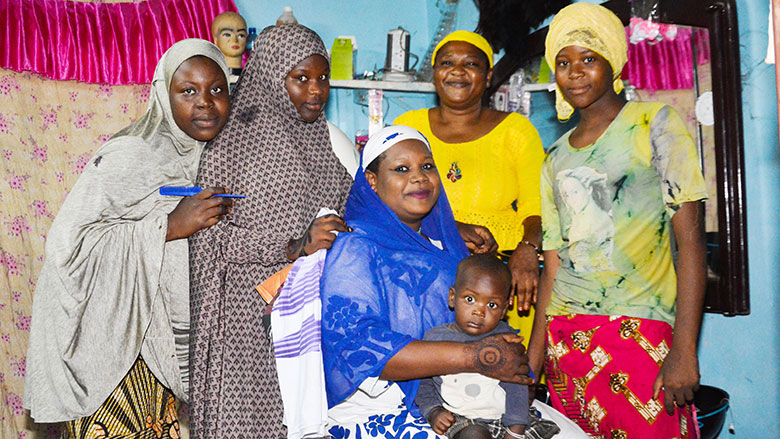Développer les compétences pour soutenir la croissance
Roumanatou fait partie des 13 000 jeunes Nigériens (dont 43 % de femmes) bénéficiaires du projet de développement des compétences pour la croissance (PRODEC) de la Banque mondiale, lancé en 2014. Le but est d’améliorer l’efficacité de la formation technique et professionnelle formelle, des formations courtes de développement des compétences et des programmes d’apprentissage dans des secteurs prioritaires comme le génie civil et la construction, la transformation des aliments, l’hôtellerie, l’agriculture et les télécommunications.
Le PRODEC entend remédier à l’inadéquation des compétences et des emplois, véritable frein à l’employabilité des jeunes et au développement. Sur les 350 000 jeunes qui se présentent chaque année sur le marché du travail, 90 % n’ont pas les qualifications requises pour les postes disponibles.
Un déficit de compétences encore aggravé par le fait que la plupart des jeunes actifs ont arrêté leurs études après le primaire. Selon l’UNESCO, plus de 197 000 enfants ont quitté l’enseignement primaire de manière prématurée en 2013, contre 55 000 en 1999. L’Institut national de la statistique indique un taux de scolarisation de 76 % en 2016 (70 % pour les filles et 82 % pour les garçons).
Photo: Djamilou Oumarou/Banque mondiale
De l’école au travail
En plus de soutenir des programmes en faveur des jeunes déscolarisés comme Roumanatou, le PRODEC s’emploie également à améliorer la transition entre l’école et le travail. Environ 3 500 jeunes diplômés de l’enseignement technique secondaire et supérieur (dont une moitié de femmes) ont bénéficié des programmes de stage pour rapprocher les étudiants des employeurs potentiels. Selon une étude de l’Agence nationale pour la promotion de l’emploi de 2017, 70 % des stagiaires ont pu, grâce à l’expérience ainsi acquise, décrocher un emploi à temps plein.
Après avoir obtenu sa licence de logistique, Hamsatou Idi Moussa, 25 ans, avait du mal à trouver un emploi. Un stage va changer la donne : « J’ai été recrutée par une grosse entreprise agroalimentaire parce que j’y avais effectué un stage et qu’ils avaient vu comment je travaillais », explique-t-elle.
Pour entretenir la dynamique initiée par le PRODEC et étendre les offres de formation aux secteurs de l’agriculture et de l’élevage, les autorités du Niger et la Banque mondiale ont signé un accord en juin 2018 pour un financement additionnel de l’IDA d’un montant de 50 millions de dollars.
From school to work
In addition to supporting programs for out-of-school youth like the one Kailou attended, PRODEC also helps to improve the school-to-work transition. Some 3,500 young graduates of technical secondary education programs and higher (half of whom are female) have benefited from PRODEC-backed internship programs that connect graduates with potential employers. According to a 2017 National Employment Agency study, 70 percent of interns were able to use their experience as a springboard to full time employment.
After completing her bachelor's degree in logistics, 25-year-old Hamsatou Idi Moussa, struggled to find work. An internship opportunity made all the difference.
“I was hired by a large food processing company because I interned there and proved myself to them,” she says.
To continue PRODEC’s momentum and expand training support to the agriculture and livestock production sectors, the Government of Niger and the World Bank signed an agreement for $50 million in additional IDA financing in June 2018.
From school to work
In addition to supporting programs for out-of-school youth like the one Kailou attended, PRODEC also helps to improve the school-to-work transition. Some 3,500 young graduates of technical secondary education programs and higher (half of whom are female) have benefited from PRODEC-backed internship programs that connect graduates with potential employers. According to a 2017 National Employment Agency study, 70 percent of interns were able to use their experience as a springboard to full time employment.
After completing her bachelor's degree in logistics, 25-year-old Hamsatou Idi Moussa, struggled to find work. An internship opportunity made all the difference.
“I was hired by a large food processing company because I interned there and proved myself to them,” she says.
To continue PRODEC’s momentum and expand training support to the agriculture and livestock production sectors, the Government of Niger and the World Bank signed an agreement for $50 million in additional IDA financing in June 2018.
From school to work
In addition to supporting programs for out-of-school youth like the one Kailou attended, PRODEC also helps to improve the school-to-work transition. Some 3,500 young graduates of technical secondary education programs and higher (half of whom are female) have benefited from PRODEC-backed internship programs that connect graduates with potential employers. According to a 2017 National Employment Agency study, 70 percent of interns were able to use their experience as a springboard to full time employment.
After completing her bachelor's degree in logistics, 25-year-old Hamsatou Idi Moussa, struggled to find work. An internship opportunity made all the difference.
“I was hired by a large food processing company because I interned there and proved myself to them,” she says.
To continue PRODEC’s momentum and expand training support to the agriculture and livestock production sectors, the Government of Niger and the World Bank signed an agreement for $50 million in additional IDA financing in June 2018.
From school to work
In addition to supporting programs for out-of-school youth like the one Kailou attended, PRODEC also helps to improve the school-to-work transition. Some 3,500 young graduates of technical secondary education programs and higher (half of whom are female) have benefited from PRODEC-backed internship programs that connect graduates with potential employers. According to a 2017 National Employment Agency study, 70 percent of interns were able to use their experience as a springboard to full time employment.
After completing her bachelor's degree in logistics, 25-year-old Hamsatou Idi Moussa, struggled to find work. An internship opportunity made all the difference.
“I was hired by a large food processing company because I interned there and proved myself to them,” she says.
To continue PRODEC’s momentum and expand training support to the agriculture and livestock production sectors, the Government of Niger and the World Bank signed an agreement for $50 million in additional IDA financing in June 2018.




